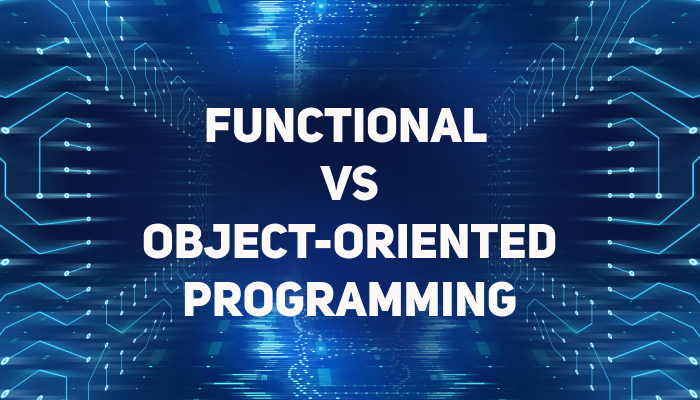
After reading through the jargon of data available online, one might still not find the reason to use Functional Programming over Object Oriented Programming or visa versa! The answer is, its more of a personal preference than being a question of which is better than the other? Lets dive into both just enough to make a choice of our own!
Functional Programming ?..?
Functional programming is the form of programming that attempts to avoid changing state and mutable data. In a functional program, the output of a function should always be the same, given the same exact inputs to the function.
This is because the outputs of a function in functional programming purely relies on arguments of the function, and there is no magic that is happening behind the scenes. This is called eliminating side effects in your code.
For example, if you call function getSum() it calculates the sum of two inputs and returns the sum. Given the same inputs for x and y, we will always get the same output for sum.
From a maintenance, logical and structural standpoint, functional programming excels when there are no histories to deal with. It works particularly well when there are no boundaries required, or those boundaries are already predefined. It thrives in situations where the state is not a factor and there is very little to no involvement with mutable data.
Functional programming provides the advantages like efficiency, lazy evaluation, nested functions, bug-free code, parallel programming. In simple language, functional programming is to write the function having statements to execute a particular task for the application. Each small function does its part and only its part. The function can be easily invoked and reused at any point. It also helps the code to be managed and the same thing or statements does not need to be written again and again. It allows for very modular and clean code that all works together in harmony.
OOP (Object Oriented Programming)?.?
Object oriented programming is a programming paradigm in which you program using objects to represent things you are programming about (sometimes real world things). These objects could be data structures. The objects hold data about them in attributes. The attributes in the objects are manipulated through methods or functions that are given to the object.
For instance, we might have a Person object that represents all of the data a person would have: weight, height, skin color, hair color, hair length, and so on. Those would be the attributes. Then the person object would also have things that it can do such as: pick box up, put box down, eat, sleep, etc. These would be the functions that play with the data the object stores.
The main deal with OOP is the ability to encapsulate data from outsiders. Encapsulation is the ability to hide variables within the class from outside access ? which makes it great for security reasons, along with leaky, unwanted or accidental usage. Most programmers using object oriented design say that it is a style of programming that allows you to model real world scenarios much simpler. This allows for a good transition from requirements to code that works like the customer or user wants it to.
 Comparison better the functional and oo programming
Comparison better the functional and oo programming
Cons comparison?.!
Cons of functional programming?. it really takes a different mindset to approach your code from a functional standpoint. It?s easy to think in object oriented terms, because it is similar to how the object being modeled happens in the real world. Functional programming is all about data manipulation. Converting a real world scenario to just data can take some extra thinking.
Similarly, there are a few problems with object oriented programing. Firstly, it is known to be not as reusable. Because some of your functions depend on the class that is using them, it is hard to use some functions with another class.It is also known to be typically less efficient and more complex to deal with. Plenty of times, some object oriented designs are made to model large architectures and can be extremely complicated.
In Conclusion?
Object-oriented languages are good when you have a fixed set of operations on things, and as your code evolves, you primarily add new things. This can be accomplished by adding new classes which implement existing methods, and the existing classes are left alone.
Functional languages are good when you have a fixed set of things, and as your code evolves, you primarily add new operations on existing things. This can be accomplished by adding new functions which compute with existing data types, and the existing functions are left alone.
To put it simply, When you?re working across different boundaries, OOP is an excellent method to keep everything packaged up and secure from unwanted external usage. Where as, Functional programming works well when complexity is contained.
One could argue, functional programming thrives in front end spaces because back ends are often giving objects for front ends to process. The client doesn?t care about maintaining object states. It?s already given to them, probably in the form of a JSON object. You don?t really need to play inception by putting an object into an object.
Object-oriented thinking works well in the back end because most of the time, you?re required to construct something to give to the next boundary. It needs to be packaged up, wrapped in ribbon before posting it away into the unknown.
Both Functional programming and object-oriented programming uses a different method for storing and manipulating the data. In functional programming, data cannot be stored in objects and it can only be transformed by creating functions. In object-oriented programming, data is stored in objects. The object-oriented programming is widely used by the programmers and successful also.
In Object-oriented programming, it is really hard to maintain objects while increasing the levels of inheritance. It also breaks the principle of encapsulation and not fully modular even. In functional programming, it requires always a new object to execute functions and it takes a lot of memory for executing the applications.
Finally, to conclude, it is always up to the programmers or developers to choose the programming language concept that makes their development productive and easy.
References:
Functional Programming vs OOP – Which One Is More Useful
Functional Programming is the technique of programming that stress on an evaluation of functions and developing the?
www.educba.com
https://itnext.io/what-is-better-functional-programming-or-object-oriented-9a116c704420


